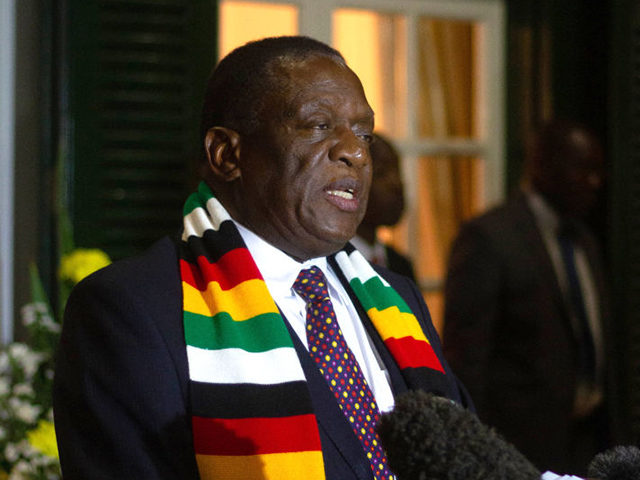The regime of President Emmerson Mnangagwa in Zimbabwe is working on a “Patriot Bill” that would punish “unpatriotic” citizens who talk to foreign governments without official approval or make “false statements that harm the country.”
The Daily Nation quoted a senior official who said the legislation has reached an “advanced stage.” Like other authoritarian regimes around the world, Mnangagwa seeks to redefine opposition as “foreign collusion” and punish it as sedition.
Zimbabwe’s effort looks very similar to the national security law China imposed on Hong Kong in June, although Mnangagwa’s officials bizarrely claimed it was modeled on the U.S. Logan Act, an esoteric 18th-century law that is occasionally invoked to justify political persecutions but has never actually been enforced against anyone:
“The Bill is premised on the constitutional provision on the foreign policy of our country, which values the promotion and protection of the national interests of Zimbabwe,” Justice, Legal and Parliamentary Affairs secretary Virginia Mabhiza told state-controlled media.
“It is the duty of the state to engage other sovereign nations on issues pertaining to foreign nations, and not self-serving citizens.
“Private citizens will have to avoid conduct such as travelling to foreign countries as self-appointed ambassadors, meeting foreign officials to undermine the national interest.”
[…]
“Conniving with foreign governments and nationals to inflict harm on the country and its citizens will be criminalized,” she added.
“For years, the ruling Zanu-PF [party] has accused the opposition of campaigning for Western sanctions against Zimbabwe,” the Daily Nation observed, recalling the party’s threat to expel U.S. Ambassador Brian Nichols for allegedly funding anti-government protests in July.
A spokesman for Zanu-PF called Nichols a “thug” who was working with a “coterie of gangsters” on “mobilizing and funding disturbances, coordinating violence, and training insurgency.”
At roughly the same time, senior Zimbabwean officials were accusing Western governments of sponsoring a journalist named Hopewell Chin’ono famed for investigating allegations of corruption, and of working with opposition politician Jacob Ngarivhume to organize protests.
Chin’ono and Ngarivhume were later arrested for “inciting violence,” imprisoned for a month, banned from social media, and forbidden to leave the capital city of Harare. Chin’ono displayed symptoms of possible coronavirus infection when he was granted bail in September. Human rights campaigners intensified their complaints about Mnangagwa’s suppression of dissent.
“The arrests of Hopewell Chin’ono and Jacob Ngarivhume are designed to intimidate and send a chilling message to journalists, whistleblowers and activists who draw attention to matters of public interest in Zimbabwe,” charged Deprose Muchena, Amnesty International’s director for eastern and southern Africa.
Another troubling incident mentioned by the Daily Nation involved the Mnangagwa regime accusing three young female opposition activists of inventing a tale of abduction and sexual assault in a bid to destabilize the government.
The women said they were arrested at an anti-government protest, kidnapped from the police station, and sexually abused by security officers. The government, including Mnangagwa himself, dismissively accused them of fabricating allegations that they were “unlawfully detained or kidnapped by some unknown people who claimed to be police officers” and charged them with violating coronavirus social distancing rules during their protest march. They face up to 20 years in prison.
The prosecution implied the women were saboteurs supported by foreign powers who would help them flee the country if bail was granted. Bail was eventually granted after the women were held for two weeks, but as with Chi’ono and Ngarivhume, they were forbidden to communicate on social media.
Zimbabwean state security minister Owen Ncube last week accused the opposition of working with foreign powers to plot a coup against Mnangagwa.
“Some rogue elements amongst us are conniving with some hostile Western governments to smuggle guns and set up so-called democratic resistance committees. They have also attempted to cause Western countries, the SADC and churches to turn against government by making false allegations of human rights abuses. The negative forces have even gone to the extent of stage-managing abductions and propagating lies on social media,” Ncube said, referring to the three women who said they were sexually abused by police.
SADC is the Southern African Development Community, a regional alliance that has been urged by human rights campaigners to join with the African Union and denounce the “repression and rampant abuses” of Mnangagwa’s government.
“It’s important for these regional institutions to send strong signals to the Mnangagwa administration that flagrant violations of the African Charter on Human and Peoples’ Rights and other human rights treaties are unacceptable,” Dewa Mavhinga of Human Rights Watch said in August.

COMMENTS
Please let us know if you're having issues with commenting.